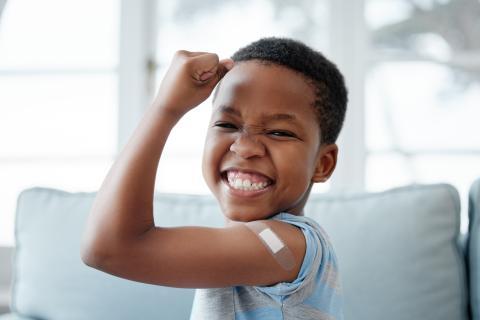Vaccines contain weakened or inactive parts of a certain virus or bacteria (antigen), which cause an immune response in the body. Some vaccines can contain the blueprint for generating antigens.
Whether the vaccine is made up of the antigen itself or the blueprint for the body to produce the antigen, this weakened version will not cause the disease in the person receiving the vaccine, but it will prompt their immune system to respond similarly to how it would have responded to the actual pathogen. This response allows the body to defend itself against the disease.
Some vaccines require repeated doses administered weeks or months apart. This is occasionally required to allow for the creation of long-lasting protection. In this way, the body is trained to fight the specific disease-causing organism, storing memory of the pathogen in order to fight it quickly if and when the body is exposed in the future.
The World Health Organization provides a series called "Vaccines Explained" that details how vaccines are developed and distributed. Click here to read more on how vaccines work.
Vaccine Protection and Infection

Vaccines offer strong protection and can stop most people from getting sick, but not everyone. Even after someone takes all of the recommended doses and waits a few weeks for immunity to build up, there is still a chance that they can get infected. Vaccines do not provide full (100%) protection, so ‘breakthrough infections’ – where people get the virus, despite having been fully vaccinated – may occur. As more people get vaccinated, it is expected that fewer people will come into contact with the disease-causing organism. Vaccinated individuals generally experience milder symptoms if they do get sick. Severe illness or death is rare.
Vaccine Efficacy vs Effectiveness
Vaccine efficacy and Vaccine effectiveness are two concepts usually mentioned in relation to vaccines and are important to understand and differentiate:
Vaccine efficacy measures how well vaccines perform in a trial setting. Clinical trials are used to develop vaccines, and provide opportunities to evaluate a vaccine’s response, safety and how well it stimulates a response in those who receive it. Vaccine efficacy is determined in a controlled clinical trial by comparing the number of people who received the vaccine to those who received a placebo. The efficacy measures how much the vaccine prevented the illness under ideal and controlled circumstances, with high efficacy resulting in fewer sick individuals.
Vaccine effectiveness measures how well vaccines perform in real-world situations. Clinical trials, which include a diverse population, cannot accurately represent the entire population. Effectiveness is measured by observing vaccines' ability to protect communities once a vaccine has been approved and launched in the general population, and can differ from trial efficacy due to unpredictable outcomes in real-life conditions.
Precaution on when a Person Cannot Receive Vaccines
Most people can and should get vaccinated. However, there are some specific circumstances in which vaccination may not be recommended. Some of these contraindications and precautions are temporary, and the vaccines can be administered later.

In general, people with a history of severe allergic reactions (for example, anaphylaxis or trouble breathing) to any component of any vaccine or medication should not take the particular medication or vaccine. Individuals with severe immunosuppression (for example, individuals with congenital immunodeficiency or illnesses such as leukemia, lymphoma, or other types of cancer) should not receive live, attenuated vaccines. Individuals currently showing symptoms of moderate or severe acute illness, with or without fever, should consult with their physician prior to receiving a vaccine.
Consult with your physician or inform your healthcare provider if you have had previous reactions to vaccination, or if you are considered a severely immunocompromised individual.
Source: WHO (2021, July 14). Vaccine Efficacy, Effectiveness and Protection. Vaccines Explained.
https://www.who.int/news-room/feature-stories/detail/vaccine-efficacy-effectiveness-and-protection